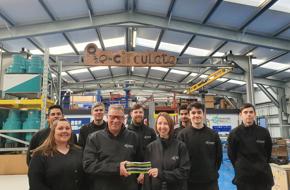Highlights
- Introduced a new, sustainable supply chain into the wind industry, refurbishing parts for wind turbines.
- Since 2019 has diverted over 86 tonnes of waste/scrap away from landfill and with that reduced customer’s carbon footprint’s by over 247 tonnes.
- Aiming to become carbon neutral by 2025.
- Recently invested in a new purpose-built Innovation Centre, to be used as a hub for circular economy and sustainability action in the renewable energy industry.
- Graduate schemes for local schools and colleges.

Renewable Parts, based in Lochgilphead and Renfrew, is a leading supply chain partner in the renewable energy industry, providing customers across the globe with consumables and components for wind turbines. Besides providing new parts, they are an innovator in the wind energy industry for refurbishing parts for wind turbines, creating a unique and sustainable circular economy supply chain as part of its offering. Pushing the boundaries on circularity, with those they do business with, is also a key strand to their business:
- working with customers to create more sustainable methods in Operations and Maintenance of turbines, and
- pushing a large amount of capital expenditure into research and development of new circular economy products, technical services, and retrofitting of newer technologies into older turbines.
The circular economy side of the business, started three years ago, refurbishing an increasing array of components for all major wind turbine brands in the UK. It has been highly successful, and results have shown there is a significant increase in the requirement for this work. Since its formation, this side of the business has diverted over 86 tonnes of waste/scrap away from landfill and reduced customer carbon footprint by over 247 tonnes.
Renewable Parts recently invested in a new purpose-built Innovation Centre which is four times the size of its former premises. The new centre will be used as a hub for circular economy and sustainability research in the renewable energy industry and will build on its team focused on furthering the company’s developments, looking at new technologies and new markets - including hydro, energy storage and solar, as these technologies become increasingly important to UK and global energy systems.
Working with other industries and collaborating on best practices and new ideas for the circular economy is critical to business growth, with Renewable Parts creating new partnerships and opportunities across other industries to research new ways of working sustainably and promoting businesses with similar goals. So far, they have fostered links with key organisations across the UK and Ireland, including the Offshore Renewable Energy Catapult, Zero Waste Scotland, University of Strathclyde, Scottish Institute of Remanufacture, Highlands and Islands Enterprise, and Trinity College Dublin, and worked with key industry policy groups, like Scottish Renewables, Renewable UK, and other stakeholders to push forward new ideas and policy through Scottish and UK governments.
Looking forward to the future of sustainability, Renewable Parts is aiming to become carbon neutral by 2025, and encourage customers, suppliers, and partners to do the same. At the top of their agenda is to create the UK’s first sustainable supply chain for the wind industry in the UK and grow to support other methods of energy generation as it becomes more important in the UK Government’s post-COVID recovery plan.
Throughout its growth, Renewable Parts has been committed to helping the community, introducing graduate schemes for the local schools and colleges, which enables students interested in manufacturing and renewable energy to get a head start in the industry, as well as employing talent from the local town and its surrounding areas.
This commitment continues as Renewable Parts moves into its new centre: prioritising local trades and community groups to finish the works. The company plans to reintroduce wildlife to its premises: with beehives and insect hotels created by local groups, and living walls with native plants and flowers, and plan to use local companies to create bespoke furniture for the inside and outside of the building. including a new wooden board room table, remanufactured plastic benches, and other benches and furniture made from repurposed components.